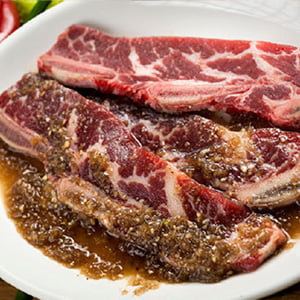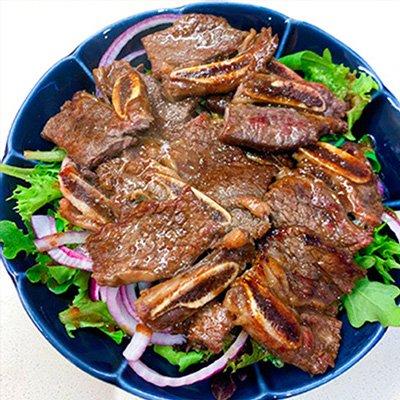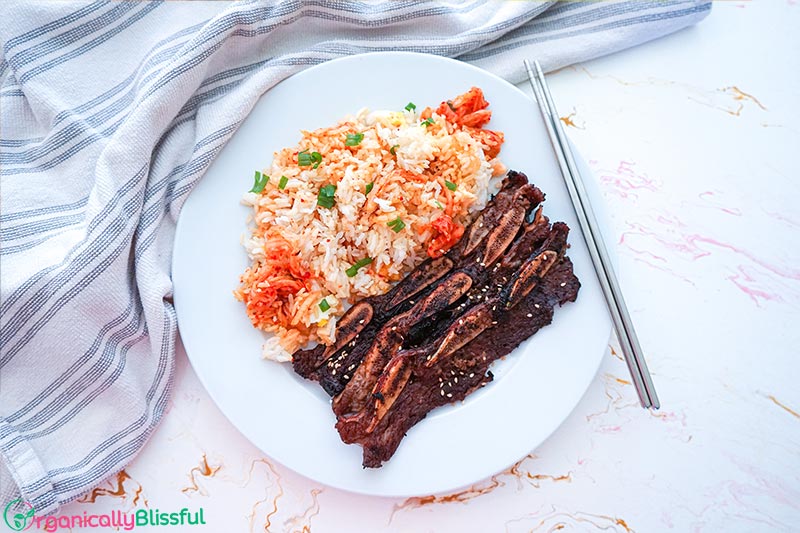Immerse yourself in Korean cuisine, where lively flavors and tantalizing aromas steal the spotlight. Among the countless treasures of this rich culinary tradition, one dish stands out as a true gem: Korean Kalbi. Bursting with savory delights, kalbi, also known as Galbi, is a tantalizingly delicious grilled short ribs dish that will transport your taste buds to the heart of Seoul.
Originating from the Korean barbecue culture, kalbi has gained worldwide recognition for its unique combination of tender beef, caramelized glaze, and an unforgettable blend of sweet and savory flavors. What sets Korean Kalbi apart from other grilled meat dishes is the secret marinade that infuses the meat with a medley of ingredients, creating an enticingly complex taste that will leave you craving more.
In this blog, we will share a juice and tender kalbi Korean short ribs recipe. Whether you're an experienced chef or a passionate home cook eager to explore new flavors, this guide will equip you with the knowledge and techniques needed to create an authentic Korean dining experience in the comfort of your own kitchen.
Kalbi (Korean Short Rib) Recipe
Prep Time
10 minutes
Cook Time
10 minutes
Rest Time
2 hours
Total Time
2 hours and 20 minutes
Ingredients
Directions
1. In a mixing bowl, blend together soy sauce, brown sugar, rice wine (or mirin), sesame oil, garlic, green onions, ginger, sesame seeds, and black pepper. Stir until the sugar dissolves and the marinade achieves a harmonious blend.

2. Arrange the beef short ribs in either a spacious resealable bag or a shallow dish. Drizzle the marinade over the ribs, ensuring complete coverage. Securely seal the bag (or cover the dish) and let the ribs marinate in the refrigerator for a minimum of 2 hours, or ideally overnight, or preferably overnight, to allow the flavors to develop.
3. Prepare your grill by preheating it to medium-high heat. For charcoal grills, wait until the coals are fully ashed over and radiating a glowing heat.
4. Take out the short ribs from the marinade, allowing any surplus marinade to drip away. Keep the marinade aside for basting purposes.
5. Lightly apply a thin coat of avocado oil to the grill grates to prevent sticking. Place the short ribs directly on the grill or in a grill tray and cook short ribs for about 2-3 minutes on each side or until they achieve a delightful golden-brown color and caramelized surface.
6. During the grilling process, occasionally brush or spoon the reserved marinade onto the ribs, ensuring they are coated with flavorful goodness.
7. After the short ribs have reached your preferred level of doneness (medium-rare to medium is recommended), take them off the grill and allow them to rest for a few minutes.
8. Optionally, garnish the grilled short ribs with chopped green onions and sesame seeds before serving.

Tips & Notes
Choose the right cut of beef: Look for beef short ribs that are flanken-style cut, which means they are cut across the bone into thin slices. This cut works best for this recipe as it grills quickly and results in tender, flavorful ribs.
Marinate for optimal flavor: Marinating the short ribs is key to infusing them with delicious Korean flavors. To achieve optimal outcomes, marinating the ribs for a minimum of 2 hours is recommended, although marinating them overnight is even more favorable. This extended duration allows the meat to fully absorb the flavors, resulting in increased tenderness.
Nutritional Facts
Nutrition Facts
Servings: 4
Calories
626
% Daily Value*
Total Fat 28.5g
37%
Saturated Fat 8.9g
45%
Cholesterol 206mg
69%
Sodium 2068mg
90%
Total Carbohydrate 21.4g
8%
Dietary Fiber 1g
3%
Total Sugars 13.6g
Protein 68.4g
Vitamin D 0mcg
0%
Calcium 84mg
6%
Iron 6mg
32%
Potassium 966mg
21%
*The % Daily Value (DV) tells you how much a nutrient in a food serving contributes to a daily diet. 2,000 calorie a day is used for general nutrition advice.
Don't skimp on the marinade: Make sure to fully coat the ribs with the marinade, ensuring each piece is well covered. By doing so, you can ensure a uniform distribution of flavors throughout the meat.
Preheat and oil the grill: Before grilling the short ribs, ensure that you preheat your grill to medium-high heat. This practice guarantees uniform cooking and aids in creating those visually appealing grill marks. Brushing the grill grates with avocado oil before cooking helps prevent the ribs from sticking.
Let them rest: After cooking the ribs, take them off the grill and allow them to rest for a few minutes prior to serving. This crucial step permits the juices to redistribute, yielding succulent and tender kalbi short ribs.
What is Kalbi
Kalbi, also known as Galbi, refers to a popular Korean dish consisting of marinated beef short ribs or Korean BBQ short ribs. The term "kalbi" translates to "ribs" in Korean. The dish is often prepared by marinating beef short ribs in a flavorful mixture, grilling or broiling them to perfection and then serving them as a main course.
In traditional kalbi recipes, the marinade typically incorporates soy sauce, brown sugar, rice wine or mirin, sesame oil, garlic, green onions, and various seasonings. The ribs undergo a marinating process, enabling the flavors to permeate the meat and elevate its flavor profile. The marinade contributes a savory, sweet, and slightly tangy flavor profile to the beef short ribs.
The beef short ribs used for kalbi are flanken-style cut, which means they are sliced across the bone into thin pieces. This cut allows for quicker cooking and optimal absorption of the marinade. The resulting dish is known for its tender, juicy, and flavorful meat with a slightly caramelized exterior.
What Ingredients You Will Need To Make Kalbi/ Korean Short Rib Recipe
Beef Short Ribs
Beef short ribs are an incredibly flavorful meat cut characterized by the marbling of fat, contributing richness and tenderness when cooked. The thin flanken-style cut enables rapid cooking and enhances the marinade's absorption for heightened flavor infusion.
At the grocery store or butcher, you'll come across two different styles of short ribs: the English cut and the flanken cut. The English cut involves separating the ribs and cutting them into shorter lengths, while the flanken cut entails thin slices across the bones.
Either cut will work for this Korean short ribs recipe, but the flanken cut is the way to go if you're looking for an authentic cut for Korean BBQ ribs. It's often called LA galbi or Korean short ribs and is the perfect choice for a delicious Korean BBQ experience.
Soy sauce
Soy sauce adds a savory and umami flavor to the marinade. It is a staple in Korean cuisine. In the absence of soy sauce, you may opt for tamari or coconut amino as viable alternatives.
Brown sugar
The marinade incorporates brown sugar to introduce a touch of sweetness. It also helps to create a caramelization effect when the ribs are grilled, adding a touch of richness and depth of flavor. In the absence of brown sugar, honey or maple syrup can serve as alternatives. If you are watching your sugar consumption, you can opt for a sweet Asian pear instead.
Rice wine or mirin
Rice wine, commonly referred to as sake, or mirin, a sweet rice wine, adds a delicate touch of sweetness and acidity to the marinade, assisting in tenderizing the meat and harmonizing the flavors. In the event that rice wine or mirin is unavailable, rice vinegar or white wine can be used as alternatives.
Sesame oil
Derived from toasted sesame seeds, sesame oil is a fragrant oil renowned for its distinctive nutty essence, elevating the marinade's flavor and enriching the dish's overall taste. It is frequently employed in Korean cuisine. In the absence of sesame oil, vegetable oil or canola oil can be substituted, albeit without the unique flavor characteristic of sesame oil.
Garlic
Garlic imparts a strong and fragrant taste to the marinade, infusing it with depth and complexity. It enhances the overall flavor profile of the dish. In the absence of fresh garlic, garlic powder can be used as an alternative, although fresh garlic is recommended for optimal results.
Green onions
Green onions, also known as scallions or spring onions, contribute a fresh and mild onion flavor to the marinade. The sliced green onions add a pleasant aroma and freshness to the dish. Finely chopped regular onions or shallots can be utilized as alternatives in the absence of green onions. However, it is important to note that the resulting flavor profile will vary slightly.
Fresh ginger
Fresh ginger introduces a comforting and subtly spicy taste to the marinade while also functioning as a natural meat tenderizer. Its presence infuses the dish with a distinctive zest and rejuvenation. Ground ginger or ginger paste can be used as substitutes if fresh ginger is unavailable.
Sesame seeds
Sesame seeds serve as a delightful garnish, contributing a nutty flavor and crispy texture to the final dish. They offer an extra dimension of fragrance and visual allure. In the event that sesame seeds are unavailable, they can be omitted or replaced with crushed peanuts or alternative seeds such as sunflower seeds. While the texture and flavor will differ, the resulting experience will still be enjoyable.
Freshly ground black pepper
Black pepper introduces a subtle touch of spiciness and amplifies the dish's overall flavor. It harmonizes with the other ingredients, imparting a sense of depth to the marinade. In the absence of black pepper, white pepper or red pepper flakes can be utilized as alternatives. Adjust the quantity according to your personal preference for heat.
How To Store Leftover Korean BBQ Short Ribs
To maintain the texture and flavor of the leftover Korean-style short ribs, it is important to let them cool to room temperature before storing them. This prevents condensation and moisture buildup.
If the Korean short ribs were served with bones, removing the meat from the bones would be more convenient for storage. Simply cut the meat off the bones and store them separately. This step is optional but can make reheating and portioning easier.
Place the leftover Korean short ribs in airtight containers, ensuring a tight seal to prevent air and moisture from entering. This aids in maintaining the meat's quality and freshness. Once they have cooled down, promptly transfer the containers to the refrigerator. Timely refrigeration is crucial to prevent bacterial growth and maintain food safety. The Korean short ribs can be refrigerated for a duration of 3-4 days.
When reheating the leftovers, it is best to use gentle heat to avoid drying out the meat. You can reheat the Korean short ribs by using a skillet over low heat, the oven at a low temperature, or the microwave with short intervals and low power settings. Adding a small amount of moisture, such as water or marinade, can help retain the moisture in the meat.
Fueling the remaining Korean short ribs is a viable choice to prolong the storage time. Place them in airtight, freezer-safe containers, ensuring minimal air exposure. It's advisable to label the containers with the date for convenient reference. The frozen Korean short ribs can be stored for approximately 2-3 months. Before reheating, thaw them overnight in the refrigerator.
Different Ways To Cook Kalbi (Korean BBQ Short Ribs)
Grilling
Grilling remains the timeless and widely embraced method for preparing kalbi. Begin by preheating your grill to medium-high heat, then proceed to cook the marinated short ribs for a few minutes on each side. This will allow them to achieve a delightful caramelization while being cooked to your desired level of doneness.
Broiling
In the absence of an outdoor grill, broiling the kalbi in the oven presents a wonderful alternative. Simply arrange the marinated kalbi on a broiler pan or a wire rack set on a baking sheet. Adjust the oven rack to approximately 6 inches below the broiler element. Proceed to broil the Korean short ribs for a few minutes on each side until they acquire a desirable browned appearance and reach your preferred level of doneness.
Pan-frying
Kalbi can be pan-fried on the stovetop using either a skillet or a grill pan. Heat a bit of oil in the pan over medium-high heat, then cook the Korean short ribs for a few minutes on each side until they are nicely seared and cooked to your desired doneness.
Slow-cooking
For a different twist, you can also try slow-cooking kalbi. Place the marinated short ribs in a slow cooker and cook on low heat for 6 to 8 hours or on high heat for 3 to 4 hours. This method will result in very tender and flavorful Korean short ribs.
Sous vide
Sous vide is a cooking technique where the marinated kalbi is sealed in a vacuum-sealed bag and cooked in a water bath at a precise temperature for a prolonged duration. This method ensures consistent doneness and results in incredibly tender meat. Once cooked, you can finish the Korean short ribs by quickly searing them on a hot grill or in a hot skillet to caramelize the surface.
Instant Pot or Pressure Cooker
If you're looking for a quicker cooking method, you can use an Instant Pot or pressure cooker. Sear the marinated short ribs in the pot using the sauté function, then add a bit of liquid (such as water or beef broth) and pressure cook for about 20-25 minutes. The Korean short ribs will come out tender and flavorful.

Frequently Asked Questions (FAQ)
What cut of beef should I use for kalbi?
Kalbi is typically made using beef short ribs, specifically the flanken-style cut, which means the ribs are thinly sliced across the bone. This cut works best for kalbi as it grills quickly and results in tender, flavorful ribs.
How long should I marinate the beef short ribs?
For optimal results, it is advisable to marinate the beef short ribs for a minimum of 2 hours to ensure the flavors deeply infuse the meat. However, for optimal results, marinating them overnight in the refrigerator is preferred as it allows the flavors to develop further.
Can I use a different type of meat instead of beef short ribs?
While beef short ribs are the traditional choice for kalbi, you can experiment with other meats like pork or chicken if desired. Please note that the cooking times and flavors may vary, so it's important to keep that in mind.
Can I make kalbi without grilling?
While grilling is the traditional method for cooking kalbi, you can still enjoy it by using alternative cooking methods such as broiling in the oven or using a stovetop grill pan. Adjust the cooking times and temperatures accordingly.
How do I prevent the ribs from sticking to the grill?
To prevent the ribs from sticking to the grill, make sure to lightly brush the grill grates with vegetable oil before cooking. This creates a non-stick surface. Also, avoid flipping the ribs too early, as they will release naturally from the grill when they are properly seared.
What should I serve with kalbi?
Kalbi is commonly served with steamed rice, lettuce leaves for wrapping, and an array of banchan (Korean side dishes) such as kimchi, pickled vegetables, seasoned soybean sprouts, and other Korean food. This combination creates a balanced and flavorful meal.
How do I know when the kalbi is cooked to the desired doneness?
The cooking time for kalbi is contingent upon the thickness of the ribs and the preferred level of doneness. To check for doneness, you can use a meat thermometer to ensure the internal temperature reaches your desired level (e.g., 135°F/57°C for medium-rare, 145°F/63°C for medium).
